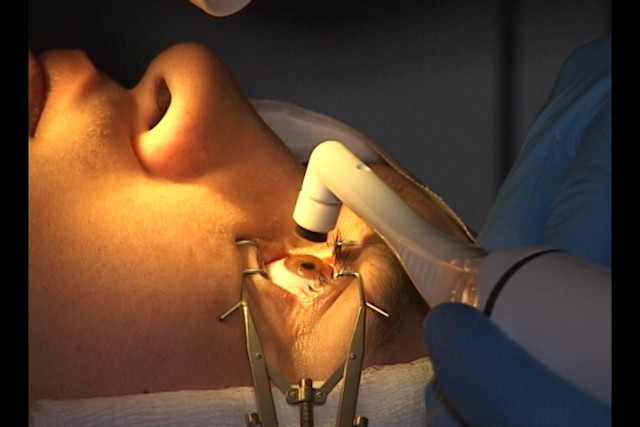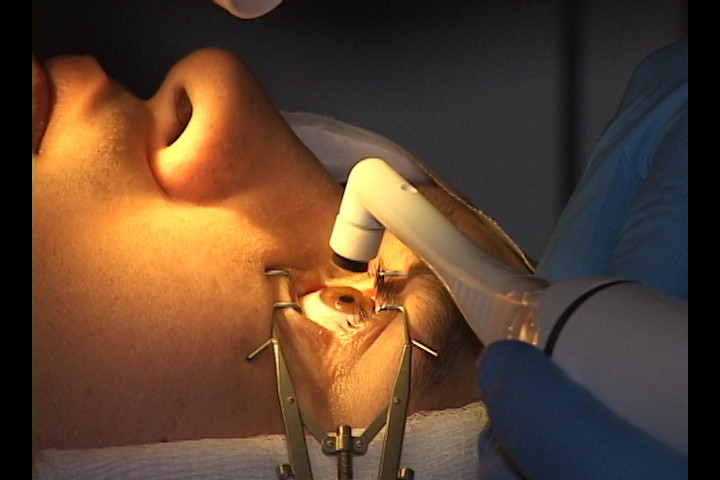FORT STEWART, Ga. - On and off the battlefield Soldiers may be faced with many challenges, yet their vision should not be one of them. The doctors in the Warrior Refractive Eye Surgery Program at Winn Army Community Hospital Eye Center agree.
According to Maj. Patrick Munson, WRESP, Ophthalmology Service Winn EC doctor, refractive eye surgery is a great benefit the Army offers. The objective of laser eye surgery is to reduce the patient's dependency on glasses or eliminate the need for glasses. The surgery, which could cost $3,000 to $6,000 on the economy, is offered free to Soldiers and they are given convalescent leave that is needed to recover.
Typically the WRESP performs more than 80 surgeries a month.
"We expect to operate on somewhere near 1,000 patients this year," said Maj. Munson. "That's pretty standard for the refractive eye center around the Army."
The WRESP offers two types of elective laser eye surgeries: Photorefractive keratectomy and Laser-Assisted Sub-Epithelial Keratectomy. Ninety percent of the Soldiers who receive laser eye surgery at Winn get PRK. Laser vision surgeries are performed by reshaping the cornea to enable light traveling through, is focused onto the retina located in the back of the eye. During PRK surgery a laser is used to reshape the cornea. The laser delivers a pulsation of ultraviolet light, which is used only on the surface of the cornea.
Both surgeries have pros and cons associated with recovery. The most common cause of poor vision after PRK is essentially a haze, which is a minimal scarring of the front surface of the eye. Medicine is given to patients to use after surgery to prevent the scarring. The other problem with PRK surgery is the slower recovery time compared to LASIK, yet PRK has the least amount of long-term post-operative problems.
The opposite is true of LASIK. During LASIK the surgeon cuts a flap on the surface of the eye and reshapes the eye underneath the cornea. LASIK surgery is more common on the civilian side than the military due to the risk involved. The flap never fully heals; it always just rests in place. A finger poke in the eye can dislodge that flap and could cause wrinkles in the flap. Another risk is possibly tearing the flap off, which could cause vision problems.
"Those are all very rare occurrences," Maj. Munson said "but it's a theoretical risk that everyone who has had LASIK has to deal with.
"From a combat war-fighting standpoint, PRK is excellent," said Maj. Munson.
He added, "Soldiers can be rendered combat ineffective so easily with losing glasses, in the middle of the night, and if a mortar goes off and they can't find their glasses then they can't respond effectively."
Six years ago Maj. Bruce Rivers, Winn EC, Ophthalmology Service doctor, received PRK surgery while assigned to Fort Hood. Major Rivers could not "function" properly without glasses and looked forward to his upcoming procedure.
"I chose to have PRK for the same reasons," Maj. Rivers explained. "I wanted something that would definitely keep me safe from an ocular perspective while I was deployed."
After the surgery he said it was the best experience he ever had."I definitely try hard to create that experience that I went through there (Fort Hood), here," Maj. Rivers said "I try to tweak on a few things that would probably make the experience a little bit better. So six years later, my vision is still 20/15 and I have no regrets. I would definitely do it again."
Continue to follow the refractive eye care story in a future edition of The Frontline newspaper.
For more information or to schedule a refractive eye care appointment, call 912-767-2020.


Social Sharing